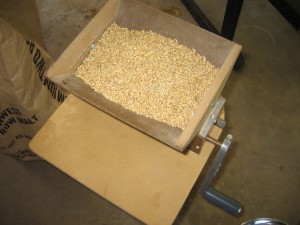Recently, Esquire published an online article titled, “Why Nobody Wants to Drink Your Home-Brewed Beer.” In it, the author — a chef named Chris Dudley — gave five reasons that (according to him) your beer sucks. What the article exuded in in-your-face attitude, it lacked in understanding of how beer is brewed or knowledge of the actual problems most commonly detected in homebrews.
Dudley’s article is so dumb, I’m not even going to bother to go through it point by point and demolish it. If you’re reading this website, you likely don’t need my help understanding what a steaming pile of dung his article is. But I would like to issue this rebuttal.
One of the overarching mistakes Dudley makes is to paint all homebrew with a single brush stroke. I’ll begin my article by making the same mistake — albeit by assuming all homebrew is wonderful. (I’ll fix that at the end.) My point will be that I can write a far superior (and technically sound) article praising homebrew than he can write damning it. With that in mind, here are my five reasons your homebrew doesn’t suck.
1.) It’s Fresh
 You know when you brewed your last batch of homebrew. You have a pretty good idea of how long it will take to condition properly. ( If not, you can always sample it to see how it is progressing.) Your homebrew doesn’t suck because you are drinking it when it is still fresh. The same can’t be said for many commercial beers.
You know when you brewed your last batch of homebrew. You have a pretty good idea of how long it will take to condition properly. ( If not, you can always sample it to see how it is progressing.) Your homebrew doesn’t suck because you are drinking it when it is still fresh. The same can’t be said for many commercial beers.
Not only is your beer fresh, but your ingredients were also fresh. You chewed a few kernels of grain before you mashed in to see if they were stale. You smelled your hops for signs of cheesiness. You tasted your brewing liquor after you filtered it and added your minerals to ensure it was good. If you brewed using malt extract, you dissolved a small amount in water to examine the color (excessively dark colors are a sign of staling) and taste.
Your homebrew doesn’t suck because it was brewed with fresh ingredients and served at its peak.
2.) It’s Been Handled With Care
From your temperature-controlled fermentation chamber to your keg fridge, your beer has been handled with care at each step along the way. Has it been bounced about in a hot delivery truck? Sloshed around in the hold of a ship? No, it has been brewed, conditioned, and served under optimal conditions.
And speaking of serving, when you do pour your beer, you pour it into glassware that’s spotlessly clean. Frequently, the glassware is appropriately matched to the beer. (Whether or not different glasses cause you to experience the organoleptic properties of the beer differently is a matter of debate; but it always show a degree of care for the beverage to serve it in the appropriate glass.)
Your homebrew doesn’t suck because it has been shepherded through the process — from grain to glass — with care and respect for the beer.
3.) It’s Brewed For You
 Your beer was not brewed to suit popular tastes. It was not brewed — as many historical beer styles are — with an eye towards minimizing the impact of the tax collectors. It was not brewed to chase the latest fad. You brewed your beer for you.
Your beer was not brewed to suit popular tastes. It was not brewed — as many historical beer styles are — with an eye towards minimizing the impact of the tax collectors. It was not brewed to chase the latest fad. You brewed your beer for you.
You picked the type of beer you wanted, drew up a recipe, and brewed it. Later, you tasted the beer, adjusted the recipe (and perhaps also your techniques) and brewed it again. You repeated that until your “house brews” — the beers you brew again and again — were tweaked to your tastes.
Your homebrew doesn’t suck because you’re not drinking a compromise — you’re drinking exactly what you want to be drinking.
4.) You Went The Distance to Make It Great
Brewing is fun, but it’s also work. Most homebrewers would agree that cleaning and ensuring proper sanitation are the least exciting parts of brewing — but we do it scrupulously for the love of our beer. Likewise, making a yeast starter can seem like a hassle sometimes, but we make one anyway to ensure an ordered fermentation.
Your homebrew doesn’t suck because you’ve done the things that need to be done to brew quality beer.
5.) You Realize It’s A Journey, Not A Destination
Most homebrewers are constantly striving to brew better beer. If you’re reading websites such as this and other sources of brewing knowledge, plus brewing on a regular basis, you’re are getting better all the time. Even if you are not currently winning ribbons at homebrewing contests or wowing your beer nerd friends, you’re on your way towards that. And that’s nothing be ashamed of. It’s hard to actually go out and do things in the world and risk failure. (In contrast, it’s easy to write shitty, snarky articles poking fun at people who are actually trying.) The beers you are brewing today are providing you with the learning experiences that will allow you to brew better beer tomorrow.
Your homebrew doesn’t suck because the saga of your homebrew is still being written.
If you’re not a homebrewer, thank you for reading this article explaining why homebrew is the bee’s knees. Go forth with the assurance that all homebrew is awesome, and so are the people who brew it. If you are a homebrewer, hang on for just a tick.
Homebrew Huddle
OK homebrewers, now that everyone else is gone, let’s face it — some homebrew does suck. Not all of it, certainly. Some of the best beers I’ve ever had have been homebrews. Then again, some of the worst beers I’ve ever had have been homebrews, too. What can we do about this?
One thing I would suggest is to help out the newbies. New brewers arrive in the hobby with boundless enthusiasm, but not always an adequate amount of knowledge and skills. And sometimes they may tend to overestimate the quality of their beers. If you know a brewer new to the hobby, point him or her to the best sources of homebrew wisdom. (See the links at the bottom of the page for tips on becoming a better brewer — and one article with tips on how to suck at it.) Invite them over for a brew day or attend a brew day at their place. Taste their beer and — gently — suggest avenues for improvement.
In addition, we’re all proud of our beers. But let’s face it, some of our beers are easier to be proud of than others. Learn how to critique your own creations, and strive to do better. This means occasionally admitting to yourself that sometimes a beer you’ve brewed wasn’t all it was cracked up to be. (I’ll start, if it helps — my last batch of porter was not up to my usual standards, and it was my own damn fault. I wasn’t paying attention to details, and it showed.) Don’t let it get you down, but when you brew a substandard beer, don’t kid yourself about its quality. Learn from your mistakes and do better next time.
In general, if you want the world to take homebrew — and homebrewers — seriously, take your homebrewing seriously. That’s more difficult than mindlessly bragging that your beer is better than the stuff “the big guys” brew, but it’s also more rewarding. And someday, if you stick with it, someone will tell you that your beer is better than most commercial beer they’ve tried.
—
Related Articles
Five More Tips for Extract Brewers
Brewing Bitter Extract-Based Beers
Five Steps Towards Being a Better Brewer
Five Steps Towards Becoming a Terrible Brewer



well written and spot on. The other article comes from a guy that clearly doesn’t brew and has no idea the time and passion behind a batch
Good reply! The author of the Esquire article seems to have no notion of the variability that we expect in beer carbonation depending on style.
Great response to that poor excuse of an article. By his logic fast food and chain restaurants are superior to home cooked meals because they have perfected their recipes and are consistent. I would have expected more from a chef, even a failed one
Can you talk about the mysterious proteins he says will form after three weeks? I guess my lack of wizardry to make proteins form out of nowhere makes my beer suck.